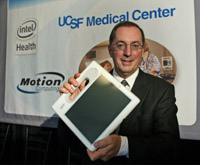As Intel's first platform built specifically for healthcare, the MCA is an important step in the company's efforts to better connect clinicians to comprehensive patient information on a real-time basis. The lightweight, spill-resistant, drop-tolerant and easily disinfected MCA allows nurses to access up-to-the-minute patient records and to document a patient's condition instantly, enhancing clinical workflow while reducing the staff's administrative workload.
Some of the Motion C5 features designed to ease the nurse's daily workload include: wireless connectivity to access up-to-date secure patient information and physician's orders; radio frequency identification (RFID) technology for easy, rapid user logon; a digital camera to enhance patient charting and progress notes, to keep track of wounds as they heal; and bluetooth technology to help capture patient vital signs.
As part of the solution, Intel and Motion Computing worked closely with electronic medical record (EMR) and other clinical software companies to refine their applications for use on MCA. Innovative technology and clinical software leaders included Allscripts, Cardinal Health, Cerner Corporation, Eclipsys Corporation, Epic Systems Corporation, GE Healthcare, iSoft, McKesson, Nexus, Siemens Medical Solutions and Welch Allyn.
To develop the MCA, Intel also conducted a broad range of pilot studies in hospitals worldwide, including El Camino Hospital in Northern California, Salford Royal NHS Foundation Trust in the United Kingdom, and Changi General Hospital in Singapore. Social scientists from Intel's Digital Health Group conducted ethnographic studies of clinicians using the MCA at each hospital to understand the platform's usage, usefulness and usability in the context of real clinical work practice. Across these hospital settings, nurses and physicians appreciated the integrated handle; immediate anytime, anywhere access to secure patient information and orders; and the docking station that allows them to easily swap batteries to achieve shift-long use.
 Paul Otellini, president and CEO of Intel Corp., displays Motion Computing's C5, the first product based on Intel's mobile clinical assistant platform, Tuesday, Feb. 20, 2007, at UCSF Medical Center in San Francisco. Lightweight, spill-resistant, durable, and easily disinfected, the mobile clinical assistant is wirelessly connected, allowing nurses to access up-to-the-minute patient records.
Paul Otellini, president and CEO of Intel Corp., displays Motion Computing's C5, the first product based on Intel's mobile clinical assistant platform, Tuesday, Feb. 20, 2007, at UCSF Medical Center in San Francisco. Lightweight, spill-resistant, durable, and easily disinfected, the mobile clinical assistant is wirelessly connected, allowing nurses to access up-to-the-minute patient records.
"Today technology comes to the aid of those who help others," said Paul Otellini, Intel president and CEO. "The mobile clinical assistant was defined and shaped by the clinicians who will use it. They have told us it will improve their decision making and patient care while easing overall workloads. This is a great example of putting innovative technology to work solving real needs."
The University of California, San Francisco (UCSF) Medical Center, one of the leading hospitals in the nation and a frontrunner in healthcare innovation, collaborated with Motion Computing on the C5's development. The medical center is now conducting pilots to measure improvements in workflow and nursing satisfaction with regard to patient care. The UCSF Medical Center is one of many hospitals showing an interest in the new MCA platform. Alegent Health, a large healthcare system across Nebraska and Iowa, is also conducting a Motion C5 study, and hospitals in several different countries have already signed on to pilot and deploy MCA in their care settings. In the United Kingdom, Intel and Motion Computing will launch the new platform, highlighting their work with the National Health Service.
Intel worked closely with Motion who embraced the vision of a new category of devices and is leading the industry in providing a better solution for nurses and doctors.
"Delivering solutions that improve the quality of care is a strategic priority for Motion, and we have heard directly from clinicians how technology can help them spend more time caring for their patients," said Scott Eckert, Motion president and CEO. "We're excited to be working with Intel to bring the C5 product to market, as well as the healthcare software community to help build the MCA platform category. We look forward to extending our outcome-driven approach to help our healthcare clients achieve their objectives for clinician productivity and patient care."
"The announcement today represents a new kind of collaboration between hardware and software companies and end-users, such as UCSF, to bring a solution to the market that better meets the needs of nurses and doctors," said Dr. Michael Blum, UCSF chief medical information officer.
For more information about the Intel MCA, please visit the Web site at www.intel.com/healthcare/mca.
Related news articles:
- Intel's Profile
About Intel in Healthcare
Intel recognizes that its work in the healthcare industry is not about solving technology problems; it's about solving people problems. The challenge inspires Intel to pursue technology definition and product development, as well as to serve in an advisory role. A prime example is guiding hospitals through the process of deploying key technologies, such as wireless networking. Intel does so by lending hospitals the design expertise of its solutions specialists, as well as by engaging the solution delivery expertise of third-party service providers.
These efforts align with the company's overall Digital Health initiative, which draws on Intel's heritage of technology innovation to help usher in improvements in the fundamental areas of healthcare quality, access and cost.
Intel, the Intel logo, Centrino, "Intel. Leap ahead.,", "Intel. Leap ahead." logo, Intel Viiv and Intel Inside are trademarks or registered trademarks of Intel Corporation or its subsidiaries in the United States and other countries. Other names and brands may be claimed as the property of others.
This device has not been authorized as required by the rules of the Federal Communications Commission. This device is not, and may not be, offered for sale or lease, or sold or leased, until authorization is obtained.